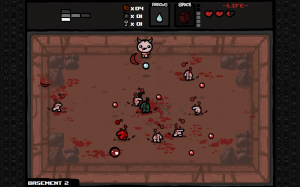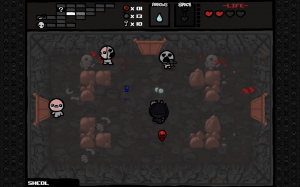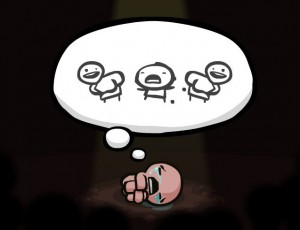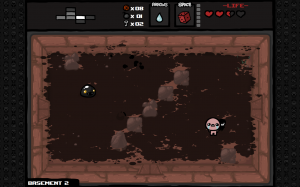…because I forgot Davy Jones died this week.
The Monkees, “A Little Bit Me, A Little Bit You”
single, 1967
…because I forgot Davy Jones died this week.
The Binding of Isaac has been the subject of some conversation today, as Team Meat, the game’s developers, have announced that Nintendo has declined to sell the game through its downloadable software services. That should come neither as a surprise nor as an announcement worthy of much discussion at all, and yet an awful lot of otherwise quiet people sure have a lot to say. NintendoLife’s news article on the announcement has over one hundred comments already, as of this writing, and it’s rare that anything but the most controversial news items get anywhere near that much discussion. And that’s not taking into account the forum post on the same topic that spans several pages.
But what’s controversial about Nintendo choosing to pass on hosting a game in its marketplace? Games — and developers — are declined all the time. Granted, we usually don’t hear about it, but there’s something unique here. There’s something about The Binding of Isaac that commenters, gamers, people feel the need to chime in about. It’s not a topic that can be allowed to pass without remark. This is a game that everybody has an opinion about, even those who haven’t played it, and believe me, brother, if somebody mentions the game in any context, you’re going to hear everyone else’s opinion, too.
The comments on the article linked above are fairly evenly split between “this game is art and Nintendo has no right to deny gamers access” and “this game is filth and Nintendo was right to decline.” My opinion is somewhere in the middle: this game is indeed art, and Nintendo was also right (or at least had a right) to decline.
There are three separate, but related, identities that we need to consider when we discuss this game: firstly, The Binding of Isaac as a piece of entertainment, followed by The Binding of Isaac as art, and finally The Binding of Isaac as a product.
 We’ll start with looking at it as a piece of entertainment…or, even more simply, as a game.
We’ll start with looking at it as a piece of entertainment…or, even more simply, as a game.
The Binding of Isaac is a Flash-based game of survival and exploration, with a heavier emphasis on the former than the latter. Its obvious reference point is the original Legend of Zelda for the NES, which it references visually throughout the game, and from which it takes many of its gameplay features, such as the finding and using of items, the treasure boxes, and the periodic boss battles. It’s a love letter to that video game classic in the same way that Team Meat’s earlier Super Meat Boy paid homage to other such early masterworks as Super Mario Bros., Mega Man and Castlevania. Team Meat knows their medium’s history, and they are quite content to package affectionate — and lovingly monstrous — reactions and responses to them as new games.
While many gamers (and, indeed, people) see such grotesque subversion as a cheap method of getting attention for a game that might not otherwise have seen a large audience, the fact is that neither Super Meat Boy nor The Binding of Isaac stop there. While shock for shock’s sake is instantly wearisome, the over-the-top bloody nightmare of Super Meat Boy revealed itself to be a brilliant and well-designed journey through clever stages and creative boss encounters. And The Binding of Isaac transcends its scatological obsession with the grotesque and hideous to become a game about games, a game that isn’t so much about survival as it is about what it means to survive. It doesn’t just push boundaries…it questions deeply the experiences we have between the boundaries we already know. It raises questions we never thought to ask, and it answers them exceedingly well. It’s designed to look like The Legend of Zelda, but its intention is to remind you of other, very different, things from your childhood: trauma, confusion, loneliness, frustration, and that feeling we’ve all had at least once — and which we all can remember so vividly if we conjure up the memory again, or have it conjured up for us — that the world is a cruel place that never wanted us here to begin with.
As you can see, we’re already drifting into a discussion of The Binding of Isaac as art, so allow me to just get the following out of my system: many times I’ve seen people shrug and say something to the effect of, “Art is in the eye of the audience.” This is their way of saying that, hey, maybe they don’t understand something, but somebody else might, and to that hypothetical somebody else, it might be art. In other words, art is subjective. Not as an experience, but as a classification. That, my friends, is bunk.
I think it’s pretty clear in the case of most works of art that they are, in fact, works of art. What it communicates to you might be entirely different from what it communicates to me, and it may not communicate anything to either of us, but art as a classification is pretty easily sniffed out by anybody who makes a legitimate attempt to engage the material.
The strawman in this argument is always something along the lines of, “Oh, they could smear excrement all over the wall and call it art, but I wouldn’t.” In reality, very few examples of actual art would be anywhere near that obtuse. Somebody indeed might call some poop on a wall art, but they could also call a cow a vegetable. There’s no law stopping them from doing so…it’s just up to us as individuals to know that they’re incorrect, whether deliberately so or innocently confused. Either way, they’re wrong, and the cow doesn’t become a vegetable to one person and not another, simply because that’s what somebody said it was.
Art is recognizable because it has notable conflagration of themes. The components of the work of art, whatever the medium, mean something. The absence of other components also means something. The fact that they’re arranged in whatever way they’re arranged means something. Art, in other words, has meaning. We can argue all day about what that meaning is, but we shouldn’t be arguing over whether or not a meaning can be experienced.
 The Binding of Isaac is obviously a deliberately crafted piece of art that is not only consistent unto itself (and therefore free of the nonsensical “shit on a wall” brush-off) but its themes are plentiful and overt. There’s no question that The Binding of Isaac has meaning. You may interpret it to be something other than I interpret it to be, but the foundation for interpretation has been laid, and sturdily.
The Binding of Isaac is obviously a deliberately crafted piece of art that is not only consistent unto itself (and therefore free of the nonsensical “shit on a wall” brush-off) but its themes are plentiful and overt. There’s no question that The Binding of Isaac has meaning. You may interpret it to be something other than I interpret it to be, but the foundation for interpretation has been laid, and sturdily.
Isaac, as a character, is a little boy who lives with his highly religious mother. The plot of the game sees poor Isaac fleeing through the basement to escape his mother, who believes she’s been called by God to re-enact the biblical account of Isaac and Abraham. Isaac fights monsters and his own psyche (often both at the same time) and uses his tears as projectiles. His sadness manifests itself as the pitiful creatures that he attacks, his mother-inherited disgust for his own physical form is reflected in the piles of dung and hideous representations of human body parts scattered around the dungeons. Between levels Isaac is haunted by a randomly summoned memory of himself being humiliated by his mother or his peers. Isaac is a damaged soul, and so is his mother. The difference is that Isaac is on the receiving end. He is powerless. He has no weapons, and he has no clothes. He seems doomed to fail. Due to the random nature of the game, he often is. There’s enough in that brief synopsis to unpack for weeks. This game has something to say. It may not always be sure what it wants to say at any given time, but that’s okay…we’re not always sure about what we’re hearing.
The strongest corollary for me here is Pink Floyd’s masterpiece concept album The Wall. The overbearing mother and the feeling of isolation and worldly entrapment are parallel themes between the two works, and just as Pink Floyd hooks unsuspecting listeners with the familiar rocking satisfaction of “Young Lust” or the anthemic sadness of “Comfortably Numb,” only to bombard them with far more complicated, despondent and often impenetrably central songs and cycles once they’re too far in to escape, The Binding of Isaac seduces that area of our brain that loved The Legend of Zelda and would love to play a gross parody of it…only to strip, disarm and humiliate us, and then force us to fight our way back toward the light…any light.
A work featuring such a questionable representation of God should certainly cause us to question the nature of God ourselves. No, not necessarily in real life, but within the universe of the piece of art. Does God exist there? Isaac’s mother thinks so…but Isaac, in the situation from which we are trying to free him, probably shouldn’t. What kind of God would really command this? Or is there no God? Or is there a God who was misinterpreted? Or perhaps a God who doesn’t even realize any of this is happening to one of His creatures.
The game seems to suggest, I’d argue, an absence of God. After all, one of the first differences Legend of Zelda fans will notice is the lack of a definite map. Every time the game begins, the levels are generated randomly. Bosses are mixed up, items are scrambled or missing, and sometimes a good portion of the areas will be inaccessible, because the game didn’t provide you with the key you needed before you found the door. The Legend of Zelda had a God. (Or, actually, three goddesses.) Things were reliable; Hyrule was a fixed commodity with an unseen force holding it all together. One room always led to another, and with enough time and practice, you could come to know what to expect. There was a heavenly constant that maybe couldn’t help you out of every jam, but could at least prevent the universe from reknitting itself beneath your feet, and leaving you in a completely different place from what you were logically led to expect.
 The Binding of Isaac has no such presence. Every step is fraught with danger, and while you may stumble blindly into the next room to find a helpful upgrade, you’re just as likely — or, probably, more likely — to find a powerful foe you’re ill-equipped to conquer. You can’t rely on your memory, and Isaac can’t count on your familiarity with his predicament. Every time you play the game, the poor kid is cast into an entirely different world of entirely different chaos. And it’s brilliant.
The Binding of Isaac has no such presence. Every step is fraught with danger, and while you may stumble blindly into the next room to find a helpful upgrade, you’re just as likely — or, probably, more likely — to find a powerful foe you’re ill-equipped to conquer. You can’t rely on your memory, and Isaac can’t count on your familiarity with his predicament. Every time you play the game, the poor kid is cast into an entirely different world of entirely different chaos. And it’s brilliant.
I think people question games like The Binding of Isaac as art because they’re obscene. (It explains their shit-stained-wall fall-back, too.) There’s some bizarre sort of reluctance to allow obscenity and art — as classifications — to intermingle, and I’m not sure why that is. Something might be obscene, they feel, or something might be art, but it certainly can’t be both. It’s an almost — ahem — puritanical outlook, and it’s dreadfully incorrect. We’ll touch on each of these pieces again in the future, I’m sure, but take a look at the Holy Trinity of Obscenity as Art: Ulysses, Lolita and Gravity’s Rainbow. From masturbating in public to pedophilia to the sexual consumption of human excrement, these books can often be utterly repugnant. And yet there’s a beauty in that repugnance. It’s not the stories they tell, it’s how they’re told. It’s not the content, it’s the context. It’s not the detail, it’s the meaning. They represent masterful artists painting repulsive portraits in language we can’t help but feel moved by. The Binding of Isaac is moving in its helplessness, in its despair, and in its ruthless, relentless tragedy. It’s an unpleasant experience, but it’s beautifully executed.
It’s also, however — getting to our third point about The Binding of Isaac as a product — unsellable. At least that’s how Nintendo feels, and, as much as I respect the game, I have to agree with their decision. They are, after all, a business first and foremost. Publishers were reluctant to touch the novels listed above, and while it might seem fun to point at the obscenity trials that plagued the comparatively-tame Ulysses, they had a point, and that point was to accurately reflect the opinions of the other human beings who occupied the world around James Joyce. Yes, many of them found Ulysses to be gorgeous and important, but others found it to be disgusting and downright criminal.
Again, I’d argue that no matter what they felt about the book, they had no right to claim it wasn’t “art.” They did, however, have every right to boycott the publisher, and Joyce, and anyone else associated with the book. After all, as consumers, their strongest vote is always in their wallet. They could stonewall publication, protest shops that carried it, and burn extant copies in the street. That much was their right. They had no right to claim it wasn’t art, but they had every right to decide they’d rather not share a world with it.
The Binding of Isaac is a difficult to stomach game that both subverts and perverts one of the best known stories of the Bible. It skewers blind faith, it punishes a naked child, and it repulsively de-sanctifies the human body. It’s mean-spirited and cruel, determinedly evil and unapologetically crass.
 But it’s art. And while art has every right to a spotlight at an exhibition for those who wish to see it, it does not have an inherent right to be offered as a digital download beside the classic NES games that inspired it. Nintendo has decided that it would rather not place The Binding of Isaac in a shop next to Super Mario Bros., and I can’t say I disagree with that decision, or that I’d have made it differently.
But it’s art. And while art has every right to a spotlight at an exhibition for those who wish to see it, it does not have an inherent right to be offered as a digital download beside the classic NES games that inspired it. Nintendo has decided that it would rather not place The Binding of Isaac in a shop next to Super Mario Bros., and I can’t say I disagree with that decision, or that I’d have made it differently.
I think it’s a great game. I think that a lot of gamers will be missing out on it because of Nintendo’s decision. But I can’t begrudge them, because as a product, it’s a bonfire and a public relations nightmare waiting to happen. Ulysses found a distributor, and so has The Binding of Isaac. The distributors who turned them down turned them down for a reason, and I respect them for that. In neither case did the reason have anything to do with withholding a work of art from those who might want to experience it; it had to do with staying in business. And, as businesses, that wasn’t a totally ridiculous decision.
Nintendo just said they’d rather not sell it. They never said it wasn’t art.
 There’s absolutely no way this is the first place you’re reading this, but James Spader will be leaving The Office at the end of this season. According to Paul Lieberstein, who pulls triple duty as show runner, writer, and actor who plays Toby, this was in the cards from the start, and it was always the intention that Spader wouldn’t stick around for longer than one season. According to common sense, on the other hand, that’s bunk.
There’s absolutely no way this is the first place you’re reading this, but James Spader will be leaving The Office at the end of this season. According to Paul Lieberstein, who pulls triple duty as show runner, writer, and actor who plays Toby, this was in the cards from the start, and it was always the intention that Spader wouldn’t stick around for longer than one season. According to common sense, on the other hand, that’s bunk.
I could get into the behind-the-scenes reasons that we already know this isn’t true, but I don’t really care to do so (unless someone asks), as I’m far more interested in pondering what this means, and what it says about the show as a whole right now.* Suffice it to say that something changed here, and since it’s Spader leaving The Office and not The Office ditching Spader, we can pretty easily guess what it was.
I’d like to imagine that Spader signed up expecting to be part of a very good show. Probably not with any expectation that the show would be as good as it was in its heyday (more on that in a moment) but at least that he’d be part of a television comedy of relatively high quality. What he got — an interpretation reinforced by the fact that he’s announced his departure now, before the season’s even over and these sorts of announcements would feel more at home — was something he couldn’t be as proud of. He signed up to play a masterfully intimidating creature of intrigue, and he was immediately reduced to an assortment of fumbled character quirks trapped in a world of broad-and-getting-broader caricatures.
Perhaps he knew that this was the direction the show had been taking for a few seasons now, but thought he could help it get better. Perhaps he hadn’t seen the show since, oh I don’t know, when Michael started his own paper company. Or perhaps he’s never seen the show and his agent just told him it was really good. Whatever the reality, it didn’t live up to the fantasy, and Spader told Lieberstein he was leaving, perhaps with a disarmingly intense glower that was a far more effective use of his off-puttingly seductive anti-charm than the show ever let him display on camera.
This season of the show has been, to put it in the most polite way possible, a pile of stinking shit. But it’s important not to place the blame on Spader, as last season might have been somewhat better but certainly wasn’t good in any sense of the word. (It also included perhaps the worst episode this show could ever produce, the abysmal and embarrassing “Threat-Level Midnight.”) The Office, in short, hasn’t been good for a long time, and I’d argue that it never even lived up to its potential even in its early years, when everybody was going ape over it. To me it just started like a watered-down imitation of its much more confident British cousin, and it pretty quickly started down the road to cartoony nonsense that it’s still hurtling down today.
None of that, again, is Spader’s fault. Nor could it possibly be. In fact, Spader was probably this show’s last hope.
I remember the interview aspect of the final episodes last season, and Spader’s character really seemed like it could take the show in an interesting direction. His coldness had a magnetic ability. He was inhuman, and yet of humans. He was terrifying, and yet the only man you’d want in charge. Whatever he was going to bring to the show, it was going to be interesting.
Then they got him there and just let him flounder as an unrealized distant-manager stereotype, who has spousal issues or something.
That’s not Spader’s fault. That’s bad writing.
My girlfriend and I have talked about the decline of this show before, and a few times we’ve returned to the idea that it can still be funny, yes, but when it’s funny it’s the actors being funny…not the writers. Andy or Creed or Darryl might still make us laugh, but not because they’ve been given good lines…it’s because Ed Helms and Creed Bratton and Craig Robinson know how to deliver even bad ones. The writing has been in decline for ages…it’s the acting that does the heavy lifting.
Spader is a great actor, but his acting didn’t elevate the material. Perhaps because he wasn’t given any material worth elevating. He did his job, he punched the clock, but at the end of the day, there was no reason for him to associate himself with this show, and I think he’s realizing that. They didn’t know how to write a character, and so they didn’t write a character. They’ve never really known how to write characters…they were just blessed from the start with a cast that could bring their own. He was promised (as we were promised) a powerhouse role that would turn the show on its ear. Then he showed up for regular appearances, and they neutered him.
The same thing, on a much larger scale, happened to Andy way back when.
I’ve said earlier that I wasn’t much a fan of the early seasons. I know that puts me in the minority, but I’m okay with that. I’m also okay with the fact that I absolutely adored one of the storylines the show stumbled upon in season three: Jim’s transfer to another branch, and specifically the introduction of Andy Bernard.
Ed Helms, simply, is brilliant in those Stamford branch episodes, and he appeared immediately on the show as one of the most fully-realized characters The Office had ever seen. That, again, is due to the acting more than the writing, as Andy not only had his scripted boastfulness to coast on, but Ed Helms’s hollow swagger, his aggressively sad eyes, and his genuinely endearing musical prowess. Andy was a lot of things at once, and when Stamford was absorbed into Scranton, the show promised some enormous conflict from the merging of the two worlds.
For perhaps the only time, The Office delivered on such a promise. Andy Bernard was simultaneously a suckup and an asshole. He was fiercely loyal and a shifty turncoat. He was endearing, and yet he was dangerous. The episodes allowed his coworkers the chance to needle him as much as he needled them, and though Andy Bernard could certainly dish it out while aggressively maintaining eye contact, he couldn’t take it. Jim plays the comparatively harmless prank of hiding his personal cell phone, and Andy, raging, punches a hole in the wall. This was no cartoon…this was a man with serious issues, and he was stuck in an office with colleagues and a manager who had no idea what to do with him.
Sadly, the show had no idea what to do with him either, and though his mandatory anger management stint made perfect logical sense, it only really served to neuter the character, and he hasn’t been the same since. We’ve spent so much time exploring the fragility of Andy’s emotions and the sadness of his upbringing that we’ve gone so far past humanization that he’s nothing but a walking sack of sad now. Watching his earlier episodes in comparison to what we’re seeing now, it’s sad. Like Jack Nicholson at the end of One Flew Over the Cuckoo’s Nest sad, only there’s nobody around with a pillow. Last season, at some point, Andy got upset and threw a pizza at the wall. I finally started paying attention again, because I thought this meant his long dormant anger issues were finally flaring up again. (It would have been logistically sound for this to happen, as well.) But, alas, by the next episode he was back to skulking around dog-faced and masturbating dark bathrooms to pictures of Erin.
I’m saying all of this because it’s is exactly what just happened with Spader’s character as well, albeit at an accelerated rate. Hell, it’s the same thing that happened with Will Ferrell’s awful character, only they didn’t even wait a full episode before they started dancing around and changing what we were supposed to think of him.
An office in reality should strive for seasons free of conflict. The Office on television needs this conflict, though, if it wants to survive. We have nobody we’re asked to hate and too many people the show wants us to love. Yet they’re all just archetypal shades with nothing that makes them feel particularly human. To feel sad is to feel human, yes, but so is to punch a hole in the wall because there’s no way to turn off your ringtone.
In that long ago, totally forgotten arc, the US version of The Office found something so much like humanity it was scary. Too scary even for the writers, who sent it away to anger management training and brought it back neutered and harmless, where it wouldn’t scare or entice viewers ever again.
Personally, I think it’s high time to bring it back. It might not mean much in the grand scheme of things, but The Office sure would be more interesting right now if I had to wonder at the start of every episode whether or not Dwight was going to get his teeth kicked out. It’d certainly be a more dynamic situation than the office full of sad-eyed nobodies we’re stuck with now.
Where have you gone, angry ‘Nard Dog? A nation turns its lonely eyes to you.
—–
*I would also have accepted “The show is a hole right now.”
 The interviews were held today for Office Life, and, ultimately, it was about what I expected. A Skype interview to test how easily we could be shaped in an editing booth to fit preconceived notions. Don’t ask me why I expected anything different. I honestly don’t know.
The interviews were held today for Office Life, and, ultimately, it was about what I expected. A Skype interview to test how easily we could be shaped in an editing booth to fit preconceived notions. Don’t ask me why I expected anything different. I honestly don’t know.
A few of the folks being interviewed really want to be on television. There were assurances tossed around about how “crazy” they are and unpredictable and other things that no doubt reflect very well upon them as employees. Somebody even stood up and did a little dance.
There’s nothing wrong with wanting to be on television, of course. I don’t know what I expected. Maybe the premise that they pitched to us (“a show about how small business is the key to revitalizing America’s economy”) worked its magic on me in spite of everything I read about the show beforehand, and which was unsurprisingly absent entirely from the interview, in which they instead wanted us to act zany and classify each other into character types like the whip-cracker, the party animal and the mother hen. The might as well have asked us to identify the Dwight, the Kelly and the Phyllis.
My The Office comparisons yesterday were mainly in jest. Now I guess they were just prescient. They want to know this stuff in advance so that they can save themselves the hassle of actually learning something about their subjects, or — horror of horrors — having to deal with a group of people that don’t line up exactly with fictional characters they know from T.V.
They’re coming to film the office next week on Tuesday and Wednesday. I’m not sure how I feel about that, and based upon the interview (from which I checked out pretty quickly, as it became all too clear all too quickly what kind of show they were hoping to produce) I might decline to sign the release form, leaving it to folks who are more comfortable making themselves look deliberately foolish in front of strangers. But we’ll see. They’ve tried to reassure us by saying that they don’t want to milk our jobs for drama, because if they got a reputation of damaging businesses nobody would pick up their series. Which is obviously and entirely true; that’s why you absolutely never see people on television who have screwed other people over to get there. It’s an entirely self-policing process that weeds out any trouble makers and I’m sorry I can’t finish typing that sentence with a straight face.
I’m not saying that I’d particularly like to costar in a documentary series, but I’d at least be open to the idea. But I don’t want to costar in a broad comedy, particularly one deliberately manufactured from “real life” material in which all the scenes that don’t feature archetypal behavior are cut for time and tedium.
In Vineland, Thomas Pynchon famously wrote that “The camera is a gun.” The older I get, the more sense that observation seems to make. It’s often wisest to move out of the way before it starts shooting.
Part of me is still open-minded, but it’s a much smaller part of me now. I’m trying to stay optimistic, but hope no longer springs eternal.
Hope instead springs ’til about next Tuesday.